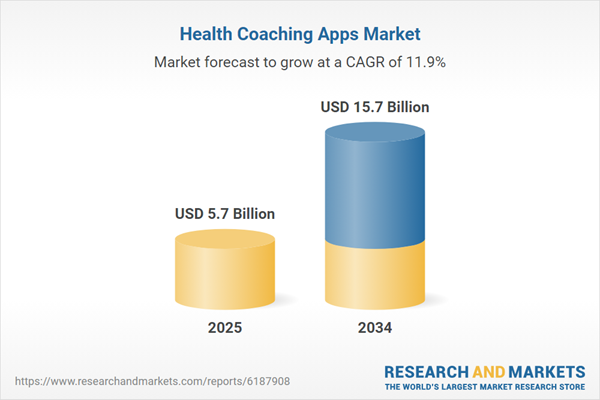The health coaching apps market has witnessed substantial growth as consumers increasingly seek digital tools for managing their physical, mental, and emotional well-being. These apps offer personalized coaching services, wellness plans, goal tracking, and integration with wearables, providing users with real-time health insights and behavioral guidance. A growing emphasis on preventive healthcare, self-management of chronic conditions, and lifestyle-related disease control has fueled the demand for digital health solutions. Health coaching apps serve as accessible alternatives to in-person consultations, bridging the gap between healthcare providers and individuals through user-friendly mobile platforms. As more people adopt smartphones and become digitally engaged with their health, the market is benefiting from an ecosystem that blends mobile technology, behavioral science, and AI-powered personalization. With increasing consumer awareness and the shift toward holistic wellness, health coaching apps are becoming essential companions in daily health routines.
The health coaching apps market experienced accelerated innovation and user engagement, driven by enhanced features and broader health coverage. Major players introduced AI-based virtual health coaches capable of tailoring advice across fitness, nutrition, sleep, and stress management categories. Mental wellness and mindfulness modules gained prominence, responding to the rising focus on emotional health. Integration with wearable devices and health monitoring tools improved real-time feedback and goal tracking, leading to more dynamic user experiences. Additionally, partnerships between health coaching platforms and insurance providers expanded, enabling users to receive app-based coaching as part of wellness benefit programs. Markets in North America and Europe led adoption, while Asia-Pacific gained momentum with growing smartphone penetration and demand for affordable digital health tools. The year also saw a surge in B2B adoption as employers included health coaching apps in workplace wellness initiatives to support employee productivity and retention.
The health coaching apps market is expected to evolve with deeper AI integration, biometric-based personalization, and broader healthcare ecosystem connectivity. Future apps will utilize predictive analytics to recommend behavior changes based on historical health data and lifestyle patterns. The rise of digital therapeutics will lead to FDA-approved coaching platforms for specific conditions like obesity, diabetes, and anxiety. Integration with telehealth services and electronic medical records will create a seamless care continuum, allowing providers to monitor and guide patients through app-based interventions. Expansion into underserved markets is anticipated, with localized content and multilingual support enhancing accessibility. Moreover, advancements in natural language processing will improve the interactivity of virtual coaches, offering more empathetic and human-like communication. As data privacy regulations mature, user trust and app engagement are expected to strengthen, reinforcing the market’s role in shaping the future of digital health and personalized care.
Key Insights: Health Coaching Apps Market
- AI-powered health coaches are increasingly being adopted in apps to deliver personalized, real-time advice based on user data, habits, and goals.
- Integration with wearable devices like fitness trackers and smartwatches is enhancing app capabilities in tracking sleep, activity, heart rate, and more.
- Mental health and mindfulness features such as guided meditation, stress relief exercises, and emotional check-ins are becoming key components of health coaching apps.
- Corporate wellness programs are incorporating health coaching apps as part of employee engagement strategies to reduce healthcare costs and boost productivity.
- Multilingual support and culturally adaptive content are gaining importance to cater to diverse populations in emerging markets and global users.
- Rising consumer awareness of preventive healthcare and wellness is encouraging individuals to use digital tools for lifestyle and chronic disease management.
- Increased smartphone and internet penetration worldwide is expanding the accessibility of health coaching apps across both developed and developing regions.
- Employers and insurers are investing in digital health solutions, driving B2B demand for health coaching platforms as part of integrated wellness offerings.
- Technological advancements in AI, data analytics, and mobile UX design are enabling more personalized, intuitive, and effective coaching experiences.
- Data privacy and security concerns remain a major challenge, as users are often hesitant to share sensitive health information without robust safeguards and transparent practices.
Health Coaching Apps Market Segmentation
By Type
- General Wellness Apps
- Fitness Apps
- Nutrition Apps
- Mental Health Apps
- Medication Management Apps
- Other Types
By Platform
- iOS
- Android
- Other Platforms
By Business Model
- Paid Apps
- Free Apps
- Freemium Apps
By End Users
- Individuals
- Healthcare Providers
- Employers
Key Companies Analysed
- Apple Inc.
- Google LLC
- Samsung Electronics Co. Ltd.
- Lenovo Group Limited
- Nike Inc.
- Adidas AG
- Under Armour Inc.
- Garmin Ltd.
- ASICS Corporation
- Teladoc Health Inc.
- iFIT Health & Fitness Inc.
- WW International Inc.
- Polar Electro Oy
- TomTom N.V.
- Omada Health Inc.
- Headspace Inc.
- Noom Inc.
- Appinventiv Technology Pvt. Ltd.
- WillowTree LLC
- Freeletics GmbH
- HealthifyMe Wellness Private Limited
- Lark Technologies Inc.
- Wahoo Fitness LLC
- Lifesum AB
- Maple Media LLC
- Azumio Inc.
- Vida Health Inc.
- Wellory Inc.
- Jefit Inc.
- Coach.me
Health Coaching Apps Market Analytics
The report employs rigorous tools, including Porter’s Five Forces, value chain mapping, and scenario-based modeling, to assess supply-demand dynamics. Cross-sector influences from parent, derived, and substitute markets are evaluated to identify risks and opportunities. Trade and pricing analytics provide an up-to-date view of international flows, including leading exporters, importers, and regional price trends.Macroeconomic indicators, policy frameworks such as carbon pricing and energy security strategies, and evolving consumer behavior are considered in forecasting scenarios. Recent deal flows, partnerships, and technology innovations are incorporated to assess their impact on future market performance.
Health Coaching Apps Market Competitive Intelligence
The competitive landscape is mapped through proprietary frameworks, profiling leading companies with details on business models, product portfolios, financial performance, and strategic initiatives. Key developments such as mergers & acquisitions, technology collaborations, investment inflows, and regional expansions are analyzed for their competitive impact. The report also identifies emerging players and innovative startups contributing to market disruption.Regional insights highlight the most promising investment destinations, regulatory landscapes, and evolving partnerships across energy and industrial corridors.
Countries Covered
- North America - Health Coaching Apps market data and outlook to 2034
- United States
- Canada
- Mexico
- Europe - Health Coaching Apps market data and outlook to 2034
- Germany
- United Kingdom
- France
- Italy
- Spain
- BeNeLux
- Russia
- Sweden
- Asia-Pacific - Health Coaching Apps market data and outlook to 2034
- China
- Japan
- India
- South Korea
- Australia
- Indonesia
- Malaysia
- Vietnam
- Middle East and Africa - Health Coaching Apps market data and outlook to 2034
- Saudi Arabia
- South Africa
- Iran
- UAE
- Egypt
- South and Central America - Health Coaching Apps market data and outlook to 2034
- Brazil
- Argentina
- Chile
- Peru
Research Methodology
This study combines primary inputs from industry experts across the Health Coaching Apps value chain with secondary data from associations, government publications, trade databases, and company disclosures. Proprietary modeling techniques, including data triangulation, statistical correlation, and scenario planning, are applied to deliver reliable market sizing and forecasting.Key Questions Addressed
- What is the current and forecast market size of the Health Coaching Apps industry at global, regional, and country levels?
- Which types, applications, and technologies present the highest growth potential?
- How are supply chains adapting to geopolitical and economic shocks?
- What role do policy frameworks, trade flows, and sustainability targets play in shaping demand?
- Who are the leading players, and how are their strategies evolving in the face of global uncertainty?
- Which regional “hotspots” and customer segments will outpace the market, and what go-to-market and partnership models best support entry and expansion?
- Where are the most investable opportunities - across technology roadmaps, sustainability-linked innovation, and M&A - and what is the best segment to invest over the next 3-5 years?
Your Key Takeaways from the Health Coaching Apps Market Report
- Global Health Coaching Apps market size and growth projections (CAGR), 2024-2034
- Impact of Russia-Ukraine, Israel-Palestine, and Hamas conflicts on Health Coaching Apps trade, costs, and supply chains
- Health Coaching Apps market size, share, and outlook across 5 regions and 27 countries, 2023-2034
- Health Coaching Apps market size, CAGR, and market share of key products, applications, and end-user verticals, 2023-2034
- Short- and long-term Health Coaching Apps market trends, drivers, restraints, and opportunities
- Porter’s Five Forces analysis, technological developments, and Health Coaching Apps supply chain analysis
- Health Coaching Apps trade analysis, Health Coaching Apps market price analysis, and Health Coaching Apps supply/demand dynamics
- Profiles of 5 leading companies - overview, key strategies, financials, and products
- Latest Health Coaching Apps market news and developments
Additional Support
With the purchase of this report, you will receive:- An updated PDF report and an MS Excel data workbook containing all market tables and figures for easy analysis.
- 7-day post-sale analyst support for clarifications and in-scope supplementary data, ensuring the deliverable aligns precisely with your requirements.
- Complimentary report update to incorporate the latest available data and the impact of recent market developments.
This product will be delivered within 1-3 business days.
Table of Contents
Companies Mentioned
- Apple Inc.
- Google LLC
- Samsung Electronics Co. Ltd.
- Lenovo Group Limited
- Nike Inc.
- Adidas AG
- Under Armour Inc.
- Garmin Ltd.
- ASICS Corporation
- Teladoc Health Inc.
- iFIT Health & Fitness Inc.
- WW International Inc.
- Polar Electro Oy
- TomTom N.V.
- Omada Health Inc.
- Headspace Inc.
- Noom Inc.
- Appinventiv Technology Pvt. Ltd.
- WillowTree LLC
- Freeletics GmbH
- HealthifyMe Wellness Private Limited
- Lark Technologies Inc.
- Wahoo Fitness LLC
- Lifesum AB
- Maple Media LLC
- Azumio Inc.
- Vida Health Inc.
- Wellory Inc.
- Jefit Inc.
- Coach.me
Table Information
| Report Attribute | Details |
|---|---|
| No. of Pages | 160 |
| Published | October 2025 |
| Forecast Period | 2025 - 2034 |
| Estimated Market Value ( USD | $ 5.7 Billion |
| Forecasted Market Value ( USD | $ 15.7 Billion |
| Compound Annual Growth Rate | 11.8% |
| Regions Covered | Global |
| No. of Companies Mentioned | 30 |









